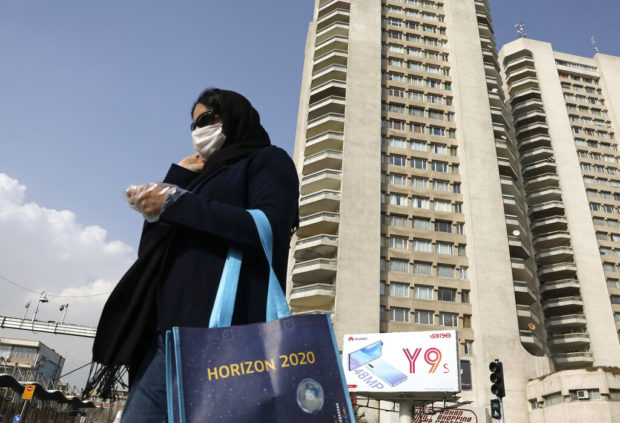
A pedestrian wearing a face mask crosses a street in northern Tehran, Iran, Sunday, March 1, 2020. While the new coronavirus has extended its reach across the world, geographic clusters of infections were emerging, with Iran, Italy and South Korea seeing rising cases. (AP Photo/Vahid Salemi)
TEHRAN, Iran — A member of a council that advises Iran’s supreme leader died Monday after falling sick from the new coronavirus, state radio reported, becoming the first top official to succumb to the illness that is affecting members of the Islamic Republic’s leadership.
Expediency Council member Mohammad Mirmohammadi died at a Tehran hospital of the virus, state radio said. He was 71.
The council advises Supreme Leader Ayatollah Ali Khamenei, as well as settles disputes between the supreme leader and parliament.
His death comes as other top officials have contracted the virus in Iran, which has the highest death toll in the world after China, the epicenter of the outbreak.
Those sick included include Vice President Masoumeh Ebtekar, better known as “Sister Mary,” the English-speaking spokeswoman for the students who seized the U.S. Embassy in Tehran in 1979 and sparked the 444-day hostage crisis, state media reported. Also sick is Iraj Harirchi, the head of an Iranian government task force on the coronavirus who tried to downplay the virus before falling ill.
Iran has reported 978 confirmed cases of the new virus with 54 deaths from the illness it causes, called COVID-19. Across the wider Mideast, there are over 1,150 cases of the new coronavirus, the majority of which are linked back to Iran.
Experts worry Iran’s percentage of deaths to infections, around 5.5%, is much higher than other countries, suggesting the number of infections in Iran may be much higher than current figures show.
Trying to stem the outbreak of the new coronavirus, Iran on Monday held an online-only briefing by its Foreign Ministry.
Foreign Ministry spokesman Abbas Mousavi opened the online news conference addressing the outbreak, dismissing an offer of help for Iran by U.S. Secretary of State Mike Pompeo.
Iran and the U.S. have seen some of the worst tensions since its 1979 Islamic Revolution in recent months, culminating in the American drone strike that killed a top Iranian general in Baghdad and a subsequent Iranian ballistic missile counterattack against U.S. forces.
“We neither count on such help nor are we ready to accept verbal help,” Mousavi said. He added Iran has always been “suspicious” about America’s intentions and accused the U.S. government of trying to weaken Iranians’ spirits over the outbreak.
The British Embassy meanwhile has begun evacuations over the virus.
“Essential staff needed to continue critical work will remain,” the British Foreign Office said. “In the event that the situation deteriorates further, the ability of the British Embassy to provide assistance to British nationals from within Iran may be limited.”
While Iran has closed schools and universities to stop the spread of the virus, major Shiite shrines have remained open despite civilian authorities calling for them to be closed. The holy cities of Mashhad and Qom in particular, both home to shrines, have been hard-hit by the virus. Shiites often touch and kiss shrines as a sign of their faith. Authorities have been cleaning the shrines with disinfectants.
Police have arrested one man who posted a video showing himself licking the metal enclosing the Imam Reza shrine in Mashhad, the most-important Shiite saint buried in the country, according to reports by semiofficial news agencies. In the video, the man said he licked the metal to “allow others to visit the shrine with peace of mind.”
Meanwhile Monday, the virus outbreak saw itself dragged into the yearslong boycott of Qatar by four Arab nations over a political dispute.
A prominent columnist at Dubai’s government-owned Al-Bayan newspaper on Twitter falsely described the virus as being a plot by Qatar to hurt the upcoming Expo 2020 world’s fair in Dubai and Saudi Arabia. Noura al-Moteari later described the tweet as “satire” to The Associated Press after it gained widespread attention.
The Dubai Media Office similarly described the tweet as being written in a “cynical style” while distancing the Arabic-language daily from al-Moteari.
“Noura is a freelance writer and is not an employee of Al-Bayan nor does she represent the publication’s views,” it told the AP. “That being said, this has no relevance to any social media policy being practiced by the publication nor the state.”
The tweet comes after Qatar expressed disappointment Sunday that nearly all of its Gulf neighbors snubbed invitations to attend the weekend peace signing ceremony between the U.S. and the Taliban.